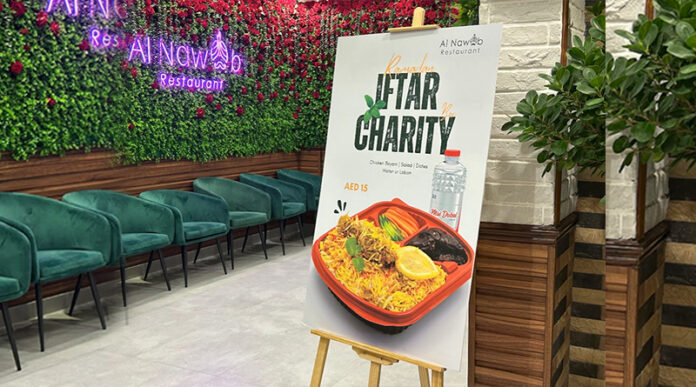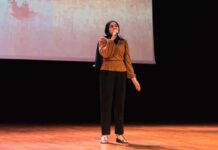By Salma Ghalwash
“Nowadays, we’re inclined to find inspiration in the richest people in the world,” says Jahanzeb Yaseen, the owner of Al Nawab restaurants in Sharjah, United Arab Emirates. He continues, “If Kylie Jenner, the youngest billionaire, asked you for AED 100 and promised 10,000 in return, you would definitely run to give her the money. If Allah is saying, ‘Give me one dirham and I will return it back 700% more,’ why would you delay?”
This specific number draws from verse 261 of Surah Al-Baqarah in the holy Quran, in which wealth spent for the sake of Allah is likened to planting one grain and receiving a harvest of 700 grains.
With two branches in Mahatta and Mujarrah in Sharjah, the start-up Pakistani restaurant embodies an essential element of cultural heritage that has Islamic roots. The local business has a team of employees dedicated solely to preparing free iftar meals. Each iftar meal is packaged in boxes with Islamic iconography such as crescents, stars and lanterns. It contains chicken biryani, dates, vegetables and a bottle of mineral water.
“In our deen (religion), you have to give regardless of whether anybody notices or not,” Yaseen says. “Our reason to give is completely to please Allah and get closer to him.”
Yaseen adds that he only seeks divine rewards from Allah, referring to the teachings of the holy Quran. He even attributes the expansion and success of his business to his faith. In 2021, Al Nawab initially had a staff of 11, which has increased to 140 employees ever since. He says that the growth of his business is a testament to the concept of “giving more and getting more in return.”
“The best thing is that two of my restaurants are completely packed till the end of Ramadan,” he adds. Adorned with intricate and vibrant artwork, Al Nawab restaurants have an airy atmosphere that accompanies the lively chatter of its customers. Greenery and flowers embellish every corner. Floral motifs and geometric patterns decorate some of the walls.
Regardless of race or religion, the restaurants “give openly to others and to all, whether they’re Christian, Muslim or Hindu.” Yaseen believes that providing relief and aid should not be limited to a certain time or place.
He affirms that “giving and spending in the way of Allah will never increase your risk.” In fact, practicing empathy and altruism can fulfill the self as much as it benefits others. From an Islamic perspective, it can enrich wealth and bless one’s health.
Yaseen recommends being “more generous during the holy month,” as this is one way to “follow the example of Prophet Muhammed peace be upon him.”
This is not the first time the restaurant has served free meals. For almost two years, Yaseen and his team have been giving back to the community in the UAE and his home country, both during and outside of Ramadan.
“Back in our country, inflation is very high and people aren’t able to even afford bread,” Yaseen explains.
In Pakistan, food prices have surged by over 45%. Food is scarce and the issue of insecurity affects nations around the world. People who suffer this economic fallout do not have the resources to break their fast, let alone celebrate the festivities of the holy month, which only comes once a year.
“We have been very much inspired by the leaders of the country and the Emirati culture,” the owner of Al Nawab restaurants says.
The efforts of local businesses can help remedy this, just as Yaseen has organized food drives to support hundreds of people per day.
Al Nawab’s philanthropic initiatives also originate from Yaseen’s experiences growing up in Dubai. As the UAE is a hub for diversity, Yaseen, like many expatriates, assimilated into a multicultural setting. Since childhood, he has witnessed the generosity embedded in Emirati culture. Reflecting on his early memories, Yaseen says he “would see Emiratis, two to three hours before iftar, open the gates of their homes for anybody that asks for a meal.”
It is common practice for Emirati people to offer iftar at mosques and even on roads to people driving during sunset.
Al Nawab restaurants have also partnered with the Sharjah City Municipality to distribute almost 900 meal boxes to migrant workers at the Al Saja’a labor camp.
Several public and private organizations aim to ensure nutritious and sufficient food for those who need it. Whether it’s setting up tents to share iftar, collecting foodstuff for disadvantaged families or distributing complimentary meals, charity is prevalent during Ramadan. The simple act of giving iftar gathers the community and nurtures compassion within society.
Although he was reluctant to highlight his charitable acts, Yaseen hopes that he can encourage other restaurants in the country to take on hunger-free initiatives, during Ramadan and all year round.


















